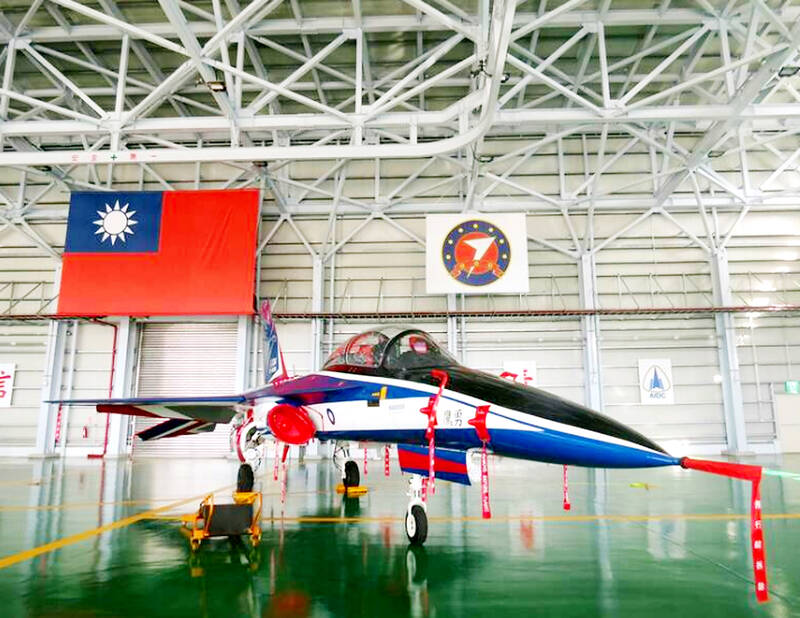Eighty-five percent of Taiwanese back the government’s autonomous development of national defense equipment, but have become less inclined to support its purchase of US arms packages due to delivery delays, an Institute for National Defense and Security Research poll showed.
Lee Kuan-cheng (李冠成), an assistant researcher at the institute’s Division of Chinese Politics, Military and Warfighting Concepts, said that 58 percent of respondents in March agreed that “Taiwan should continue purchasing US military equipment and arms to strengthen its defensive capabilities,” down from 65 percent a year earlier.
A delay in the delivery of the M136 Volcano automated mine-laying system, and false news that surrounded the sale of the system, might have led to the drop in support, Lee said.

Photo: Taipei Times file
The overwhelming public support for the government’s autonomous development of national defense equipment showed that more Taiwanese are beginning to understand that to prevent Taiwan’s defense from being affected by international situations, it must retain the ability to research and develop its own weapons systems and equipment, he said.
The public are becoming increasingly aware of the threat posed by China, as there was an increase in the number of respondents who agreed that national defense expenditure should grow, the poll report said.
The delivery of locally manufactured surface ships, the T-5 Brave Eagle trainer jet and the expected delivery of the indigenous submarine program’s prototype in September have increased public support for the government’s indigenous defense programs, it said.
Solid public support for such programs would lay the foundation for continued investment in and the growth of national defense industries, the report said.
The institute commissioned the National Chengchi University’s Election Study Center to conduct the poll via telephone from March 23 to 29.
The poll primarily targeted individuals aged 18 or older, and received 1,535 valid responses with a margin of error of 2.5 percentage points.
Polled respondents lived on Taiwan proper, with the nation’s outlying islands excluded.

Taiwan has received more than US$70 million in royalties as of the end of last year from developing the F-16V jet as countries worldwide purchase or upgrade to this popular model, government and military officials said on Saturday. Taiwan funded the development of the F-16V jet and ended up the sole investor as other countries withdrew from the program. Now the F-16V is increasingly popular and countries must pay Taiwan a percentage in royalties when they purchase new F-16V aircraft or upgrade older F-16 models. The next five years are expected to be the peak for these royalties, with Taiwan potentially earning

STAY IN YOUR LANE: As the US and Israel attack Iran, the ministry has warned China not to overstep by including Taiwanese citizens in its evacuation orders The Ministry of Foreign Affairs (MOFA) yesterday rebuked a statement by China’s embassy in Israel that it would evacuate Taiwanese holders of Chinese travel documents from Israel amid the latter’s escalating conflict with Iran. Tensions have risen across the Middle East in the wake of US and Israeli airstrikes on Iran beginning Saturday. China subsequently issued an evacuation notice for its citizens. In a news release, the Chinese embassy in Israel said holders of “Taiwan compatriot permits (台胞證)” issued to Taiwanese nationals by Chinese authorities for travel to China — could register for evacuation to Egypt. In Taipei, the ministry yesterday said Taiwan

Taiwan is awaiting official notification from the US regarding the status of the Agreement on Reciprocal Trade (ART) after the US Supreme Court ruled US President Donald Trump's global tariffs unconstitutional. Speaking to reporters before a legislative hearing today, Premier Cho Jung-tai (卓榮泰) said that Taiwan's negotiation team remains focused on ensuring that the bilateral trade deal remains intact despite the legal challenge to Trump's tariff policy. "The US has pledged to notify its trade partners once the subsequent administrative and legal processes are finalized, and that certainly includes Taiwan," Cho said when asked about opposition parties’ doubts that the ART was

If China chose to invade Taiwan tomorrow, it would only have to sever three undersea fiber-optic cable clusters to cause a data blackout, Jason Hsu (許毓仁), a senior fellow at the Hudson Institute and former Chinese Nationalist Party (KMT) legislator, told a US security panel yesterday. In a Taiwan contingency, cable disruption would be one of the earliest preinvasion actions and the signal that escalation had begun, he said, adding that Taiwan’s current cable repair capabilities are insufficient. The US-China Economic and Security Review Commission (USCC) yesterday held a hearing on US-China Competition Under the Sea, with Hsu speaking on